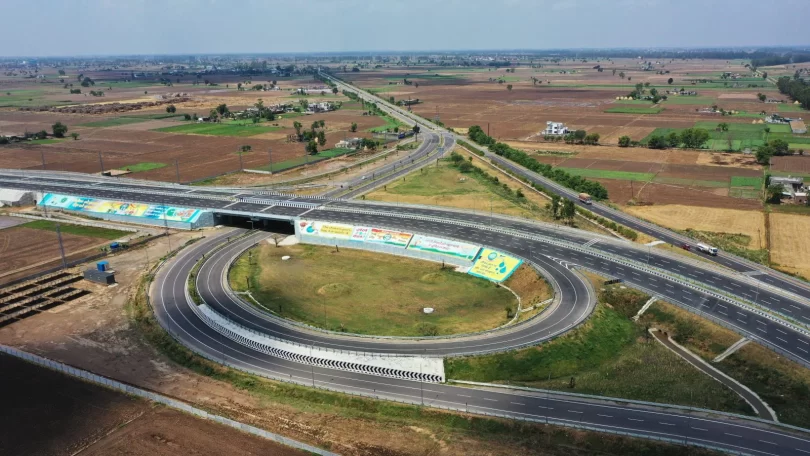[ad_1]
Last Updated: September 13, 2022, 14:16 IST

The government has made infrastructure development a top priority to improve the cost of doing business. (Image: Twitter/Nitin Gadkari)
At the time when infrastructure development is being projected as the key pillar of growth and socio-economic advancement in the country, cost overrun has become one of the biggest challenges before the government
The government is committed to provide impetus for growth through investment in infrastructure projects. The budget 2022-23 depicts the firm commitment of the government to boost economic growth by investing in infrastructure development. This is persisted by a steep rise in capital expenditure by Rs 1.96 lakh crore or 35.4 percent to Rs 7.5 lakh crore in the current financial year over Rs 5.54 lakh crore in FY22.
The government has made infrastructure development a top priority to improve the cost of doing business. At the time when infrastructure development is being projected as the key pillar of growth and socio-economic advancement in the country, cost overrun has become one of the biggest challenges before the government.
The cost overrun of a project is the amount by which actual expenditures exceed the budget amount. It is an outrageous wastage of money and resources and not good for the fiscal health of any country, especially for a developing country like India. The risk and uncertainties inherent to the infrastructure sector are more than any other sector and this sector shows poor management of these risks. Hence, a number of projects fail to meet budget targets and time schedules.
The total original cost of implementation of the 1,505 projects was Rs 21.22 lakh crore and their anticipated complementation cost is to be Rs 25.93 lakh crore. The expenditure incurred on these projects is Rs 13.50 lakh crore which is 52.08 percent of the anticipated cost and 63.62 percent of the original cost. The total cost overrun is Rs 4.71 lakh crore. It is 22.19 percent of the original cost of the project. In other words, we can say that cost overrun is the wastage of taxpayers’ money as about 62.8 percent of the amount made for capital expenditure in the budget 2022-23 is cost overrun.
The ongoing infrastructure projects costing Rs 150 crore and above on time and cost overruns are being monitored by the Ministry of Statistics and programme Implementation (MoSPI) through the Infrastructure and Project Monitoring Division (IPMD). The monitoring of the implementation of the central sector projects is being done through the mechanism of online computerisation monitoring system (OCMS) on the basis of information provided by implementation agencies.
According to the 440th Flash Report of the ministry for the month of July 2022, there are 1,505 central sector projects entailing an investment of Rs 150 crore and above on the monitor of the Ministry of Statistics and Programme implementation (MoSPI) as on 1 August 2022. Of these, 386 projects slipped into cost overruns, 222 projects reported both time and cost overruns with respect to their original schedule of completion. Apart from this, 661 projects were delayed with respect to their original schedule. The average time overrun in these delayed projects is 41.83 months.
What are the reasons for time and cost overruns of projects? Why do we fail to weed out these hurdles that delay these projects? As per the written reply in the Rajya Sabha in July 2021 and in the Lok Sabha in February 2021 of minister of MoSPI, the reasons for cost and time overruns are project specific that depends upon a variety of financial, technical and administrative factors. The reasons vary from project to project.
Moreover, major reasons according to quarterly report of MoSPI for cost overruns are: delay in land acquisition, changes in rates of foreign exchange and statutory duties, forest clearance, fund constraints, delay in supply equipment, rehabilitation and resettlement of project-affected people, slow progress in works, contractual issues, geological surprises, change of ownership of executing agency, state-wise lockdown due to Covid-19, etc.
Though the cost overruns could not be avoided, the cost escalation due to delay in project could be minimised. The monitoring mechanism put in place by the government to avoid the cost and time overrun of projects has to be made more effective and realistic through fixing responsibilities. The wastage of money and resources on account of cost overrun can be handled through a meticulous monitoring and developing suitable course of action on priority to ensure timely completion of projects scheduled for commissioning.
Vinay K Srivastava is the author of ‘Privatisation of Public Enterprises in India’ and teaches at ITS Ghaziabad. Twitter: @meetdrvinay. Views expressed are personal.
Read all the Latest Opinion News and Breaking News here
[ad_2]
Source link








